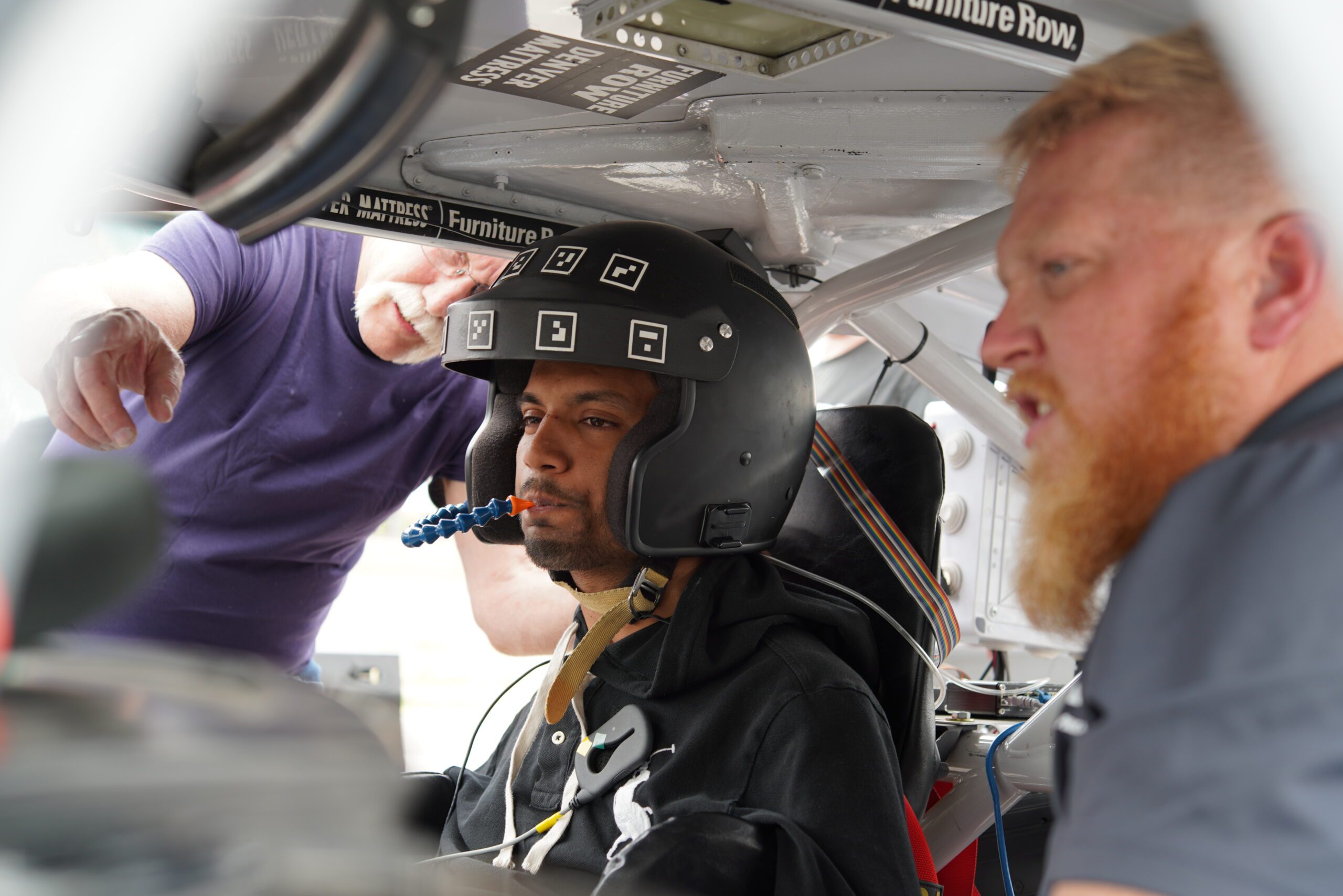June 2022 – In May of this year Miami Project researchers, along with industry leader Falci Adaptive Motorsports (FAM), showcased their revolutionary brain-controlled driving technology for the very first time at Pikes Peak International Raceway. The event helped bring to life a dream of driving a NASCAR racecar for a previously paralyzed research participant.
German Aldana Zuniga is a research participant in the University of Miami Miller School of Medicine’s Miami Project to Cure Paralysis brain-machine interface program and has a sensor implanted on the surface of his brain which can detect electrical signals generated by his thoughts. The scientists and engineering collaborators at The Miami Project and FAM combined forces to be able to capture a specific thought or “electrical fingerprint” from German and feed that information into FAM’s computer interface which controls the drive mechanism of the racecar.
German, controlled the throttle of the NASCAR racecar with thought, using the sensor implanted on the surface of his brain by neurosurgeon Dr. Jonathan Jagid from UM’s Department of Neurological Surgery and using other existing technologies. What once was unimaginable is now a reality thanks to FAM’s technological advancements paired with brain machine interface technology as part of a special collaboration between the University of Miami’s The Miami Project, Department of Neurological Surgery and Biomedical Engineering.
“I never had my driver’s license before my accident and I come and I see this race car looking intimidating … when you accelerate, it doesn’t go slow, it goes very fast,” said Zuniga. “After the first lap, I felt that rush and freedom. It felt good. I just wanted to do more and more laps.”
Through this unique partnership, a brain-machine-controlled driving system came together to enable thought alone to operate a vehicle. When the brain creates a thought, an electrical signal or “fingerprint” is generated by the brain, specific to the particular thought. An electrode placed strategically on the surface of German’s brain captures the brain’s electrical signals generated from the natural task of him imagining moving his hand. Then sophisticated computer algorithms were developed to recognize the various “electrical fingerprints” specific to different imagined hand movements. The computer, after recognizing the electrical signature from a particular thought, can then turn the brain activity into a digital signal that can send commands—via a computer—to different devices, in this case the car’s throttle mechanism.
Initially the experimental implant was intended to help German use an orthotic device for increased hand function and movement. Once that proved successful in the lab setting, the research team tested an at home device that included specialized gloves that allowed him to do things for himself that would have been impossible before the surgery and extensive training.
“What’s unique about this device is that German is able to use this device in a meaningful way outside of the lab setting. So he’s able to take this device into his home,” said Dr. Jonathan Jagid, a Professor of Clinical Neurological surgery at the University of Miami Miller School of Medicine and The Miami Project. “We’re not just doing something in a lab. We’re trying to create stuff that improves the quality of life right now for people who have spinal cord injuries.”
This first successful phase the project had the German pulling out of “pit row” and accelerating around the track using thought alone. Turns and braking were executed with movement of the driver’s head through an in-car camera and helmet system.
“I am blessed to experience the joy and inspiration these folks receive every time they get into our racecar…FAM and its mission has simply been a joy for me and I look forward to what this new collaboration may do to help with mobility and independence,” said Dr. Scott Falci, Founder of Falci Adaptive Motorsports.
In addition to Dr. Jagid, members of the team included, neurosurgeons Michael Ivan, M.D. and Iahn Cajigas, M.D. Also, Abhishek Prasad, Ph.D., Annie Palermo, Ph.D., Noeline Prins, Ph.D., Jasim Ahmad, Ph.D., Steven Vanni, D.O., Kevin Davis, Sebastian Gallo, Audrey Wilson and Letitia Fisher.
About Falci Adaptive Motorsports Falci Adaptive Motorsports (FAM) is a nonprofit organization founded by esteemed neurosurgeon, Dr. Scott Falci. FAM brings adaptive motorsports to individuals with mobility impairments. Through use of an adaptive NASCAR Cup Racecar, FAM develops adaptive technologies which bring mobility and independence to the community.

